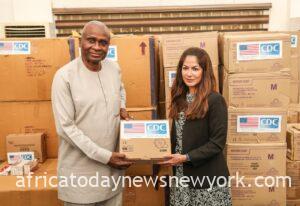The United States Center for Disease Control has contributed state-of-the-art disease detection tools to Nigeria, bolstering the nation’s ability to swiftly tackle health crises.
Dr. Jide Idris, Director-General of the Nigeria Centre for Disease Control and Prevention, formally accepted the donation of equipment such as biosafety cabinets, sample collection tools, and crucial laboratory resources on a Friday in Abuja.
Highlighting the crucial role of cooperation, Farah Husain, the Programme Director of the U.S. CDC Division of Global Health Protection, stressed the importance of collective efforts in addressing Nigeria’s disease outbreak challenges.
Husain stressed the importance of the donated equipment in ensuring the quality and efficiency of Nigeria’s laboratory services.
She reaffirmed the United States’ commitment to supporting Nigeria’s response capacity and protecting public health.
She also expressed pride in the partnership between the two countries, emphasising the importance of working together to prevent and respond to outbreaks effectively.
The Programme Director noted, “The United States is committed to working hand-in-hand with Nigeria to build response capacity and protect the health of our people.
“Today, we gather to celebrate a concrete example of the strong partnership between the United States and Nigeria.
“The U.S. Government, via the U.S. Centre for Disease Control and Prevention, is proud to donate equipment and supplies to the Nigeria Centre for Disease Control and Prevention to support emergency response laboratory activities.”
Read also: At Least 10 Hospitalised As Strange Disease Hits Kafanchan
Acknowledging Nigeria’s ongoing disease outbreaks, including Lassa fever, diphtheria, and meningitis, Husain underscored the vital role of laboratory scientists in detecting and confirming cases swiftly.
She stressed the urgent need for additional resources to cope with the increased volume of laboratory work during simultaneous outbreaks and also highlighted the provision of personal protective equipment to ensure the safety of laboratory workers, emphasizing the donation’s potential to save lives.
“Nigeria is currently facing several ongoing disease outbreaks, including Lassa fever, diphtheria, and meningitis.
“Laboratory scientists play vital roles in quickly detecting and confirming cases, which is crucial for an effective outbreak response.
“The increased volume of laboratory work created by these simultaneous outbreaks creates a pressing need for additional resources.
“Together, with laboratories as the cornerstone of our collaborative work, we can quickly and effectively prevent and respond to outbreaks,” the programme director stated.
In his remarks, Idris assured the US government that the donated equipment would be utilized judiciously to enhance Nigeria’s disease detection and response capabilities.
He also reiterated the significance of health security in safeguarding the well-being of the population, emphasizing the importance of collaboration and partnerships at various levels to achieve common objectives in disease prevention and response.
He explained, “No government can fund the health system and that is why we require this kind of collaboration from different partners.
“The idea and the goal is to reduce the incidences. What concerns us mostly is health security. This is key because a nation’s mandate to the people is to ensure that the health of the people is sacrosanct in terms of preventing any disease.
He finally mentioned that according to their previous statement, the government is providing financial support to the sector, although the current funding might not be sufficient. The healthcare system incurs high costs, and it is unrealistic to expect any single government to fully finance it independently. Such collaboration from various partners is essential in addressing this challenge.

